英语思维品质研究报告范文
英语思维品质研究报告

英语思维品质研究报告英语思维品质研究报告一、引言英语思维品质是指在使用英语进行交流和思考时,个体所展现出的一系列思考方式和品质。
随着英语的全球影响力日益扩大,英语思维品质对个人发展和职业成功的重要性也越来越突出。
本研究旨在探讨英语思维品质的重要性以及培养方法。
二、重要性1.促进跨文化交流:英语作为世界上最广泛使用的第二语言,具有无与伦比的跨文化交流作用。
具备良好的英语思维品质可以促进不同文化之间的交流和理解,有助于拓宽个人的国际视野。
2.提升学习能力:研究表明,学习英语可以训练思维的灵活性、创造性和逻辑性。
良好的英语思维品质有助于培养个体信息处理和分析的能力,提高学习效果。
3.增强问题解决能力:使用英语进行思考和交流要求个体具备良好的逻辑思维和批判性思维能力。
培养英语思维品质可以提高个体的问题解决能力和决策能力。
三、培养方法1.多听多说:通过多听英语原版音频以及多说英语,可以提高个体的语感和口语表达能力,培养英语思维的流畅性和自信心。
2.多读多写:大量阅读英语原版书籍和文章,积累词汇和表达方式,同时进行英语写作练习,锻炼表达和思考的能力。
3.参与讨论和辩论:积极参与英语讨论和辩论活动,提升个体的批判性思维和逻辑思维能力,培养解决问题的能力。
4.跨文化交流:积极参与国际交流活动,与不同文化背景的人士进行交流,增加对不同文化的了解,培养跨文化思维的品质。
5.配合学习工具:借助网络和各种学习工具,如单词记忆APP、英语学习网站等,提高学习效率和兴趣,加深对英语思维品质的培养。
四、结论英语思维品质对个人的发展和职业成功具有重要作用。
通过多听多说、多读多写、参与讨论和辩论、跨文化交流以及配合学习工具等方法,可以提高英语思维品质,培养个体在使用英语时的思考方式和品质。
在全球化的时代背景下,培养良好的英语思维品质已经成为个人成长和职业发展的必要条件。
思维状况分析作文英语
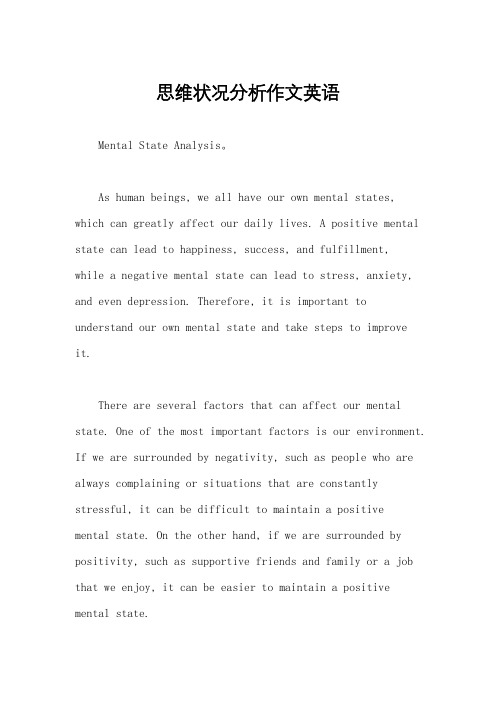
思维状况分析作文英语Mental State Analysis。
As human beings, we all have our own mental states, which can greatly affect our daily lives. A positive mental state can lead to happiness, success, and fulfillment,while a negative mental state can lead to stress, anxiety, and even depression. Therefore, it is important to understand our own mental state and take steps to improve it.There are several factors that can affect our mental state. One of the most important factors is our environment. If we are surrounded by negativity, such as people who are always complaining or situations that are constantly stressful, it can be difficult to maintain a positivemental state. On the other hand, if we are surrounded by positivity, such as supportive friends and family or a job that we enjoy, it can be easier to maintain a positive mental state.Another factor that can affect our mental state is our own thoughts and beliefs. If we constantly have negative thoughts, such as "I'm not good enough" or "I'll never succeed," it can be difficult to maintain a positive mental state. However, if we have positive thoughts, such as "I can do this" or "I am capable of achieving my goals," it can be easier to maintain a positive mental state.Our physical health can also affect our mental state.If we are not taking care of our bodies, such as by not getting enough sleep or exercise, it can be difficult to maintain a positive mental state. On the other hand, if we are taking care of our bodies, such as by eating healthy and getting regular exercise, it can be easier to maintain a positive mental state.Finally, our relationships with others can affect our mental state. If we have supportive and loving relationships, it can be easier to maintain a positive mental state. However, if we have toxic relationships, it can be difficult to maintain a positive mental state.In order to improve our mental state, there are several steps we can take. First, we can try to surround ourselves with positivity by seeking out supportive friends and family and engaging in activities that we enjoy. Second, we can work on changing our own thoughts and beliefs by practicing positive self-talk and challenging negative thoughts. Third, we can take care of our physical health by getting enough sleep, eating healthy, and getting regular exercise. Finally, we can work on improving our relationships with others by setting boundaries and seeking out healthy relationships.In conclusion, our mental state is an important factor in our daily lives. By understanding the factors that can affect our mental state and taking steps to improve it, we can lead happier, more fulfilling lives.。
如何培养思维品质英文作文

如何培养思维品质英文作文How to Cultivate Thinking Quality。
Thinking quality is an important part of a person's overall quality. It is the basis for solving problems, making decisions, and creating value. Therefore,cultivating thinking quality is crucial for personal development and success. In this essay, I will discuss how to cultivate thinking quality from three aspects: knowledge accumulation, logical thinking, and creative thinking.The first step in cultivating thinking quality is to accumulate knowledge. Knowledge is the foundation of thinking. Without a certain amount of knowledge, it is difficult to think deeply and comprehensively about a problem. Therefore, we should actively learn and accumulate knowledge in various fields, such as history, science, literature, and philosophy. Reading books, watching documentaries, and attending lectures are all effective ways to acquire knowledge. In addition, we should alsocultivate a habit of continuous learning, keep up with the latest developments in various fields, and constantly update our knowledge.The second step in cultivating thinking quality is to develop logical thinking. Logical thinking is the ability to analyze problems, identify the relationships between different elements, and draw reasonable conclusions. It is the basis for making rational decisions and solving complex problems. To develop logical thinking, we need to practice analyzing and reasoning. For example, when we encounter a problem, we should try to break it down into smaller parts, identify the key elements, and analyze their relationships. We can also use logical thinking to evaluate arguments and distinguish between facts and opinions. In addition, we can also practice logical thinking through puzzles, games, and other activities that require reasoning and problem-solving skills.The third step in cultivating thinking quality is to foster creative thinking. Creative thinking is the ability to generate new ideas, insights, and solutions. It is thebasis for innovation and entrepreneurship. To foster creative thinking, we need to cultivate an open mind, embrace diversity, and think outside the box. We should be willing to challenge conventional wisdom, explore new perspectives, and take risks. We can also practice creative thinking by brainstorming, mind mapping, and other techniques that stimulate creativity. In addition, we can also seek inspiration from art, music, nature, and other sources of creativity.In conclusion, cultivating thinking quality is a lifelong process that requires continuous effort and practice. By accumulating knowledge, developing logical thinking, and fostering creative thinking, we can enhance our thinking quality and achieve greater success in life.。
核心素养视野下中学生英语思维品质培养的实践研究

LOGO
5 第
部分
课题研究的方法
5 研究方法
方法1 文献研究法
方法2
方法3
调查研究法 个案研究法
方法4 行动研究法
6 第
部分
课题研究的进度与分工
06 课题研究的进度
研究思路:本课题从学校的现有学生 的实际学习情况出发,以初中英语核 心素养的标准和内涵为依据,以发展 培养学生思维品质的要求为参照,积 极规划各项活动的策略方案,综合运 用案例研究法和文献研究法,坚持理 论构建和实践的探索。 :
报告及论 文
2021.6
严洁 王淑芬
基于思维品质培养的系列 研讨课
课堂实录 教案集
2020.01-12
严洁
王淑芬
思维品质发展的多元化评 估
调查报告
2021.01-02
潘叶飞
杭婷
结题研究报告
报 告 及 论 2021.04--
文
06
严洁
王淑芬
9 第
部分
课题研究可能的创新之处
09 研究的可能创新处
1.课本知识与课外延伸相结合:在思维品质的培养过程中不仅关注基于课本内容设计 的各项教学活动,另外结合校本课及英语学科节等多项活动,对学生进行训练,全面 提升学生思维品质的多样性。 2. 结合布鲁姆认知规律(记忆,理解,应用,分析,评价,创造,思维)设计教学活 动,改善教学设计,调整课堂结构,总结经验策略。 3.做好思维品质培养过程中对学生的多元化评价并实时监测学生思维品质的发展 4. 归纳思维品质培养过程中的经验和策略,形成教学模式,在课堂中教学中再运用。
LOGO
4 第
部分
在小学英语绘本教学中培养思维品质的探究获奖科研报告

在小学英语绘本教学中培养思维品质的探究获奖科研报告Picture book teaching; Thinking quality; Core literacy 《普通高中英语课程标准(2017年版)》(以下简称《新课标》)在小学英语的课程定位和宗旨方面发生了重大改变,小学英语将不再把学科作为主要课程,而是转变为以学科育人为主要课程,将思维品质列为学生英语学科核心素养的重要内容。
思维品质的发展将对学生的核心思维、解决问题的能力、创造性的培养起到重要作用。
本文以《新课标》的要求为前提,结合现下小学英语绘本教学课堂现状,对促进学生思维品质的发展,培养学生具有逻辑性、批判性、和创新性的思维能力,并通过思维品质的提升更深刻地理解绘本故事的主题意义进行研究和探讨。
一、思维品质的定义及重要性教育的最终目的是使每一个人的潜能得到充分发挥,使每一个学生能够成为更好的自己。
课程的功能也绝不仅仅是传授知识,而应当注意发掘教材中的道德因素,寓道德教育于语言教学中,使学生学会如何做人,养成健康向上的品格。
思维品质是指人的思维个性特征,反映在其思维的逻辑性、批判性、创新性等方面所表现的水平和特点。
它作为英语学科核心素养的一个重要内容,应被教师重视起来。
并在绘本教学中,教师不应只带学生读懂故事,引导学生掌握故事,更要从故事的内容和整体中挖掘教育意义。
思维品质的提升有利于提高学生的思维能力,培养学生的创新意识,增强学生的英语语言能力、提高自主学习的效率,以及形成跨文化意识,因此,在英语故事教学中促进学生思维品质的发展势在必行!二、提升学生思维品质的策略在英语绘本教学中,培养和发展学生的思维品质,就是引导学生观察图片和文本,获取信息、分析评价、体会情感、总结道理和意义的过程,帮助学生学会观察、比较、分析、推断、归纳、建构、辨识、评价、创新等思维方式,增强学生思维的逻辑性、批判性、和创造性,提高思维品质。
作为小学英语教师,应做哪些方面的努力去引导和帮助学生培养思维品质呢?小学阶段的学生对新的事物表现出强烈的兴趣,他们非常看重自己在群交往中所发挥的地位和作用。
思维品质语言能力英语作文
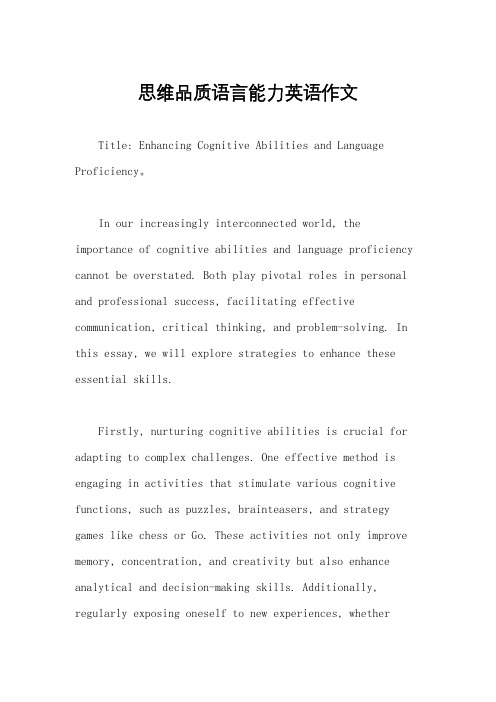
思维品质语言能力英语作文Title: Enhancing Cognitive Abilities and Language Proficiency。
In our increasingly interconnected world, the importance of cognitive abilities and language proficiency cannot be overstated. Both play pivotal roles in personal and professional success, facilitating effective communication, critical thinking, and problem-solving. In this essay, we will explore strategies to enhance these essential skills.Firstly, nurturing cognitive abilities is crucial for adapting to complex challenges. One effective method is engaging in activities that stimulate various cognitive functions, such as puzzles, brainteasers, and strategy games like chess or Go. These activities not only improve memory, concentration, and creativity but also enhance analytical and decision-making skills. Additionally, regularly exposing oneself to new experiences, whetherthrough travel, reading diverse literature, or learning new skills, can broaden perspectives and stimulate cognitive growth.Furthermore, language proficiency, particularly in English, is increasingly indispensable in today'sglobalized society. To enhance language skills, immersionis key. Surrounding oneself with the language through media, such as movies, TV shows, podcasts, and music, accelerates learning by providing exposure to authentic speech patterns and vocabulary usage. Moreover, actively engaging in conversations with native speakers or language exchange partners helps improve fluency and comprehension.Additionally, leveraging technology can greatly aid in enhancing cognitive abilities and language proficiency. There is a myriad of apps and online platforms specifically designed to develop cognitive skills through interactive exercises and games. Similarly, language-learning appsoffer personalized lessons, interactive activities, and opportunities for real-time communication with native speakers, making language acquisition more accessible andengaging.Another effective strategy is incorporating mindfulness practices into daily routines. Mindfulness meditation has been shown to improve cognitive functions such as attention, memory, and cognitive flexibility. Moreover, practicing mindfulness can reduce stress and anxiety, which can hinder cognitive performance and language acquisition. Bycultivating a present-focused awareness, individuals can optimize their cognitive abilities and language learning potential.Furthermore, adopting a growth mindset is essential for continuous improvement. Embracing challenges, persisting in the face of setbacks, and seeking feedback are hallmark characteristics of a growth mindset. Rather than viewing intelligence and language proficiency as fixed traits, individuals with a growth mindset believe in their capacity to develop and improve over time through effort and practice. This mindset fosters resilience and a willingness to take on new challenges, ultimately leading to greater cognitive growth and language proficiency.In conclusion, enhancing cognitive abilities and language proficiency is a lifelong journey that requires dedication, practice, and a multifaceted approach. By engaging in activities that stimulate cognitive functions, immersing oneself in the target language, leveraging technology, practicing mindfulness, and adopting a growth mindset, individuals can unlock their full potential and thrive in an increasingly interconnected world. Through continuous learning and self-improvement, we can navigate the complexities of the modern era with confidence and proficiency.。
高中英语阅读教学中培养学生思维品质的策略优秀科研论文报告

高中英语阅读教学中培养学生思维品质的策略优秀科研论文报告摘要:在高中英语教学当中,英语占据着重要的地位,其可以对学生的思维以及交流能力等方面起到积极地作用。
因此在以将核心素养落实到英语阅读教学当中的每一个环节,英语阅读教学可以很好地提高学生对语言的学习能力,还能保证其思维品质得到有效的提升,对此英语教师应注重其英语阅读教学的作用,从而提高对学生的教学策略。
关键词:高中英语; 阅读教学;教学策略引言:对一个学生的学习阶段来说,高中阶段是极其重要的,尤其是在英语教学当中,学生必须通过英语教学来提高自身的阅读理解能力,通过这种教学方式来提高自己。
在核心素养教学模式之下,应将知识教育转变为素养教育,以确保学生可以通过英语知识的学习过程中,可以得到最佳的发展效果,因此在英语教学当中阅读理解的培养是极其重要的。
一、思维品质的具体内涵关于学生治理水平以及思维水平之间所存在的差异可以用思维品质来代替,其中主要从六大方面体现出其中的差距所在,即灵活性、系统性、敏捷性、原创性、批判性以及深刻性。
而利用英语教学的改变将可以对思维品质进行有效的改善,从而让学生进行更好的发展。
在这六大方面当中,灵活性指的是学生思维的灵活,保证学生能够在思维方向上获得强大的迁移能力;系统性指的是思维活动要保持秩序,其能够反映出信息整合的能力;敏捷性指的是进行思维活动的反应速度,代表着智力方面的敏感程度。
原创性则代表着学生在思维上的创造能力;批判性代表着学生能够拥有谨慎的思维方式,通过这种方式来思考出自身想要的结果;深刻性代表着学生在进行思维活动过程当中的难度、广度以及深度,使其拥有更强的逻辑层次。
为了有效的提升思维质量,就必须具备丰富的思维品质,如此一来才能保证学生在面对问题时能够展开更为理想的分析,利用科学合理的方法来做出相对应的解决措施。
因此当英语教师在进行英语教学当中,可以在英语句子的结构、阅读思维、语音词汇等方面进行考虑结合,从而实现培养学生思维的目标[1]。
英语思维品质研究报告
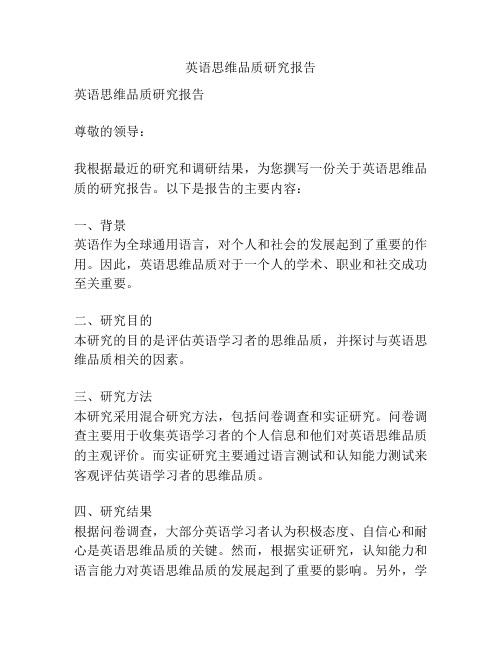
英语思维品质研究报告英语思维品质研究报告尊敬的领导:我根据最近的研究和调研结果,为您撰写一份关于英语思维品质的研究报告。
以下是报告的主要内容:一、背景英语作为全球通用语言,对个人和社会的发展起到了重要的作用。
因此,英语思维品质对于一个人的学术、职业和社交成功至关重要。
二、研究目的本研究的目的是评估英语学习者的思维品质,并探讨与英语思维品质相关的因素。
三、研究方法本研究采用混合研究方法,包括问卷调查和实证研究。
问卷调查主要用于收集英语学习者的个人信息和他们对英语思维品质的主观评价。
而实证研究主要通过语言测试和认知能力测试来客观评估英语学习者的思维品质。
四、研究结果根据问卷调查,大部分英语学习者认为积极态度、自信心和耐心是英语思维品质的关键。
然而,根据实证研究,认知能力和语言能力对英语思维品质的发展起到了重要的影响。
另外,学习环境、教学方法和学习动机也与英语思维品质有一定的关联。
五、讨论与结论本研究结果表明英语思维品质的形成受多方面因素的影响,包括个体内部的认知能力和语言能力,以及外部的学习环境、教学方法和学习动机。
因此,为了提高英语思维品质,我们建议:1.鼓励学习者培养积极的学习态度、自信心和耐心,以应对学习过程中的挑战。
2.提供良好的学习环境和教学方法,以促进学习者的思维发展和语言能力提高。
3.激发学习者的学习动机,使他们对学习英语保持持续的兴趣和热情。
六、研究局限与展望由于本研究的样本数量有限,需要更广泛的研究来验证结果的普遍性。
未来的研究可以深入探讨不同背景和年龄群体对英语思维品质的影响。
以上是关于英语思维品质的研究报告。
希望这些结果对于改善英语学习者的思维品质和提高英语学习效果有所帮助。
谢谢!敬上XXX日期:XXXX年XX月XX日。
以英语阅读提升高中学生思维品质的实践研究

以英语阅读提升高中学生思维品质的实践研究1. 引言1.1 背景介绍Background Introduction:In recent years, there has been an increasing focus on the importance of enhancing critical thinking skills among high school students. As the world becomes more interconnected and complex, the ability to think critically and analytically has never been more crucial. One effective way to foster critical thinking skills is through improving students' English reading abilities.1.2 研究目的Through this research, we seek to provide valuable insights into the significance of fostering a culture of reading and critical thinking among high school students. By developing their skills in reading and interpretation, we hope to empower students to think more analytically, creatively, and independently. Additionally, by engaging with English texts that cover a wide range of topics and genres, students can broaden their perspectives, enhance their communication skills, and deepen their understanding of complex ideas.1.3 研究意义The significance of this research lies in the potential impact it can have on high school students' cognitive development. By focusing on improving students' English reading skills, we are not only enhancing their language proficiency but also promoting critical thinking, analytical skills, and creativity. These are essential qualities that will benefit students not only in their academic pursuits but also in their future careers and personal lives.2. 正文2.1 提升高中学生英语阅读能力的必要性Improving high school students' English reading ability is essential for their overall academic and personal development. English is not only a subject in the curriculum but also a gateway to information, knowledge, and opportunities in the globalized world. Here are some reasons why enhancing high school students' English reading skills is necessary:2.2 实践方法介绍Secondly, implementing group reading activities where students collaborate on reading assignments and discuss their interpretations can foster a deeper understanding of the text. Bysharing their perspectives and insights with peers, students can broaden their perspectives and challenge their own assumptions.2.3 实践效果分析在本研究中,我们通过对一所高中学生进行英语阅读提升实践活动后,进行了详细的效果分析。
初中英语阅读教学中培养学生思维品质的实践研究
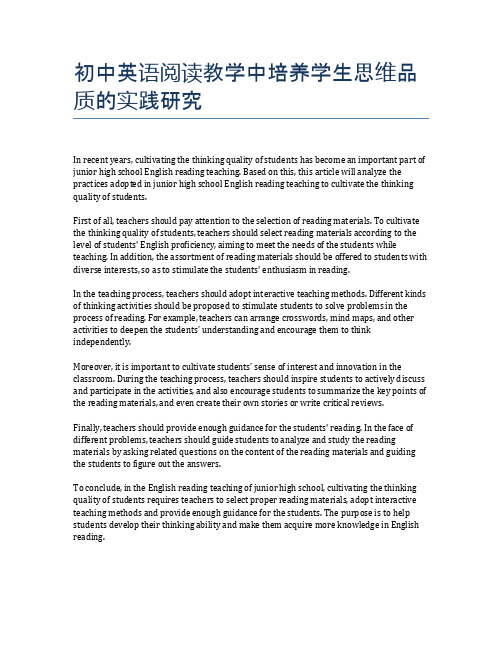
初中英语阅读教学中培养学生思维品质的实践研究In recent years, cultivating the thinking quality of students has become an important part of junior high school English reading teaching. Based on this, this article will analyze the practices adopted in junior high school English reading teaching to cultivate the thinking quality of students.First of all, teachers should pay attention to the selection of reading materials. To cultivate the thinking quality of students, teachers should select reading materials according to the level of students' English proficiency, aiming to meet the needs of the students while teaching. In addition, the assortment of reading materials should be offered to students with diverse interests, so as to stimulate the students' enthusiasm in reading.In the teaching process, teachers should adopt interactive teaching methods. Different kinds of thinking activities should be proposed to stimulate students to solve problems in the process of reading. For example, teachers can arrange crosswords, mind maps, and other activities t o deepen the students’ understanding and encourage them to think independently.Moreover, it is important to cultivate students’ sense of interest and innovation in the classroom. During the teaching process, teachers should inspire students to actively discuss and participate in the activities, and also encourage students to summarize the key points of the reading materials, and even create their own stories or write critical reviews.Finally, teachers should provide enough guidance for the students' reading. In the face of different problems, teachers should guide students to analyze and study the reading materials by asking related questions on the content of the reading materials and guiding the students to figure out the answers.To conclude, in the English reading teaching of junior high school, cultivating the thinking quality of students requires teachers to select proper reading materials, adopt interactive teaching methods and provide enough guidance for the students. The purpose is to help students develop their thinking ability and make them acquire more knowledge in English reading.。
依托初中英语语篇教学提升学生思维品质的实践研究

依托初中英语语篇教学提升学生思维品质的实践研究The role of English language teaching in the development of students' thinking quality has long been a subject of discussion and research in the field of education. As a crucial component of the curriculum, English language education not only aims to impart linguistic knowledge and skills but also serves as a powerful tool for cultivating students' cognitive abilities, critical thinking, and problem-solving skills. This essay will delve into the practical research on leveraging junior high English text teaching to enhance students' thinking quality.In the context of junior high education, English language teaching plays a pivotal role in shaping students' intellectual growth and personal development. The carefully selected English language texts, which encompass a diverse range of topics and genres, serve as a gateway to the exploration of new ideas, perspectives, and cultural insights. By engaging with these texts, students are challenged to step outside their comfort zones, question their assumptions, anddevelop a more nuanced understanding of the world around them.One of the key aspects of this practical research is the emphasis on fostering critical thinking skills through English language teaching. Critical thinking, a cornerstone of intellectual development, involves the ability to analyze, evaluate, and synthesize information, as well as to formulate well-reasoned arguments and make informed decisions. By incorporating tasks and activities that encourage critical thinking, such as close textual analysis, comparative studies, and problem-solving exercises, English language teachers can help students cultivate these essential cognitive abilities.For instance, when exploring a literary text, students can be prompted to delve into the underlying themes, character motivations, and narrative techniques employed by the author. Through guided discussions and written assignments, they can be encouraged to question the assumptions made in the text, consider alternative interpretations, and develop their own informed perspectives. This process not only enhances their understanding of the English language but also hones their critical thinking skills, enabling themto approach complex issues with a more nuanced and analytical mindset.Moreover, the integration of problem-solving activities within the English language curriculum can further contribute to thedevelopment of students' thinking quality. By presenting students with real-world scenarios or hypothetical situations, teachers can challenge them to apply their linguistic knowledge and problem-solving strategies to find creative and effective solutions. This approach not only reinforces the practical application of English language skills but also fosters the development of divergent thinking, creativity, and the ability to navigate ambiguity.Another crucial aspect of this practical research is the emphasis on cultivating students' metacognitive skills through English language teaching. Metacognition, the awareness and regulation of one's own thought processes, is a fundamental component of effective learning and problem-solving. By incorporating activities that encourage students to reflect on their learning strategies, monitor their comprehension, and adjust their approaches accordingly, English language teachers can help students develop a deeper understanding of their own cognitive processes.For instance, during the reading of an English text, students can be prompted to pause periodically and reflect on their level of understanding, the challenges they are facing, and the strategies they are employing to overcome those challenges. This metacognitive awareness not only enhances their reading comprehension but also equips them with the tools to approach other academic tasks and real-life problems with greater self-awareness and adaptability.Furthermore, the practical research on leveraging junior high English text teaching to improve students' thinking quality should also consider the role of collaborative learning. By engaging students in group discussions, peer-to-peer feedback, and collaborative problem-solving activities, teachers can foster the development of social-emotional skills, such as communication, empathy, and the ability to consider multiple perspectives.When students work together to analyze and interpret English language texts, they are exposed to diverse viewpoints and are challenged to articulate and defend their own ideas. This process not only strengthens their language proficiency but also cultivates their ability to engage in constructive dialogue, negotiate differences, and arrive at mutually beneficial solutions. By nurturing these social-emotional skills, English language teaching can contribute to the holistic development of students' thinking quality, preparing them for the demands of the 21st-century world.In conclusion, the practical research on improving students' thinking quality through junior high English text teaching is a multifaceted endeavor that encompasses the development of critical thinking, metacognitive skills, and social-emotional competencies. By strategically integrating these elements into the English languagecurriculum, educators can empower students to become independent, adaptable, and collaborative learners, equipped with the cognitive tools necessary to navigate the complexities of the modern world. As this research continues to evolve, it will undoubtedly play a crucial role in shaping the future of education and the holistic development of students.。
关于英语学科核心素养的思维品质培养教学研究论文.doc

关于英语学科核心素养的思维品质培养教学研究论文下面给大家带来的是一篇关于英语学科核心素养的思维品质培养教学研究论文,英语学科;里面的思维品质培养应该怎么去培养?这篇论文一起欣赏!英语学科是教育的重要组成部分,其教学效果直接影响到学生对英语学习的看法和认识。
本文立足于英语学科核心素养的视域和当前高中课程教学的现状,通过202X年与202X年英语高考全国卷I书面表达的对比评析,探讨通过形成教师的教学活动观以及思维引领、思想碰撞和参与学习等教学启示培养学生的英语学科思维品质。
随着202X年9月13日《学生发展核心素养》的正式发布,以学生发展核心素养的十八个基本要点为指导,把核心素养落实到各个学科教学中成为迫切任务。
英语学科核心素养明确指出要把学生培养为具有语言能力、文化意识、思维品质和学习能力的全面发展的人。
在这教育转型的关键时期,具备核心专业素养的高中英語教师能更好地贯彻和落实学生专业素养的培养,特别是思维品质的培养,而学生的思维品质培养的关键是在教师的教学活动中。
1.高中英语课程及教学的现状长期以来,社会把教育狭隘化,“教育”已广泛被理解为“应试”。
为了更好地备考,教材被分块消灭,出现了学生答案被标准化,学生思维被束缚。
这与素质教育“充分发掘人的天赋条件,提高人的各种素质水平,并且使其得到全面、充分、和谐发展”的基本理念背道而驰。
碎片化知识的弊端可以用王蔷的六个“难以”来使社会警醒,难以帮助学生形成自主思考;难以帮助学生形成逻辑;难以使学生在事物之间建立关联;难以使学生形成网络化的知识结构,难以使所学知识纳入自身认知体系;更难以使学生形成有深度的、复杂的、全面的分析与判断能力,难以使学生形成分析和解决问题的能力和良好的个人文化品格与正确的价值观。
更不用说有效执行202X年教育部研制印发的《关于全面深化课程改革落实立德树人根本任务的意见》。
2.英语学科核心素养要素之思维品质英语学科核心素养包含了四个组成部分:语言能力、文化意识、思维品质和学习能力。
关注学生思维品质提升的初中英语阅读教学研究获奖科研报告

关注学生思维品质提升的初中英语阅读教学研究获奖科研报告摘要:初中英语阅读是提升学生语言能力和思维品质的主阵地,而现阶段的初中英语阅读教学以应试为主,忽视了对学生思维品质的培养。
英语学科核心素养要求教师在教学中要认真解读文本、分析文本,设计有梯度的问题,启发、锻炼和培养学生的逻辑性、批判性等思维能力。
关键词:初中英语、阅读教学、思维品质英语学科的核心素养主要包含:语言能力、思维品质、文化意识和学习能力四个方面。
思维品质指的是人的思维个性特点,能够反映个人在思维方面的逻辑性、批判性及创造性等特点和水平。
如何在初中英语阅读课中提升学生的思维品质、丰富学生的思维方式,为学生的终身学习发展奠定基础显得尤为重要;更是当今素养教育背景下的形势所迫。
一、初中英语阅读课思维活动现状受传统教学模式的影响,英语阅读教学成为应试性教学,过多重视模仿记忆,轻体验感知,重词汇语法,轻文本理解,重技巧训练,轻思维训练(付薇2015)。
阅读课的语言思维能力和品质提升功能被弱化乃至边缘化。
教师的问题设计缺乏梯度,缺乏思维的深度和广度,多以信息提取为主,忽略了问题设计的链接性和递进性,更忽视了预测、判断、概括、探究、质疑等思维活动,使阅读的思维含量大大降低,学生的阅读能力水平得不到提高,究其原因主要是学生的阅读思维没有被激活,或者激活的程度低。
比如读前的思维训练活动不够开放、容易出现“冷场”;读中的思维训练活动缺乏层次和梯度,多层次、深层次探究活动难以执行;读后的思维训练任务缺乏个性化的思考和见解,学生的批判性思维难以提升。
二、思维品质提升在阅读教学中的重要性教育心理学认为,思维的发展决定着整个知识系统的结构与功能。
一个具有良好思维品质的人,在遇到问题时,能从多角度,多层面去思考。
其解决问题的方法也不是单一的,而是多方案,多种途径的。
阅读教学理论认为,阅读过程是个主动的、语言和思维相互作用、创造性地学习运用语言的过程(杨连瑞1995)。
基于思维品质培养的小学英语深度学习研究
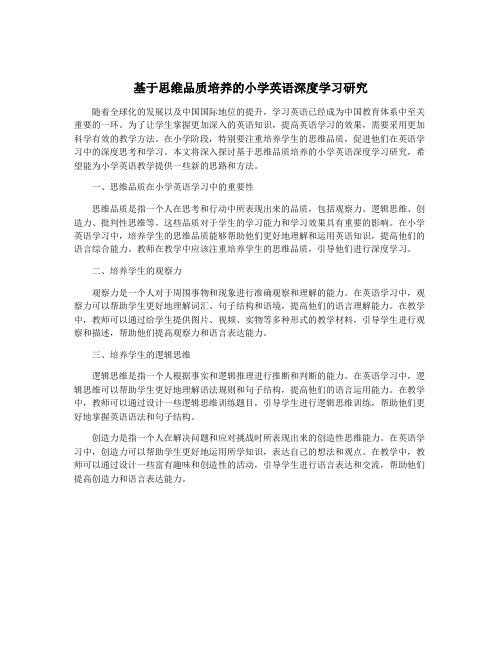
基于思维品质培养的小学英语深度学习研究随着全球化的发展以及中国国际地位的提升,学习英语已经成为中国教育体系中至关重要的一环。
为了让学生掌握更加深入的英语知识,提高英语学习的效果,需要采用更加科学有效的教学方法。
在小学阶段,特别要注重培养学生的思维品质,促进他们在英语学习中的深度思考和学习。
本文将深入探讨基于思维品质培养的小学英语深度学习研究,希望能为小学英语教学提供一些新的思路和方法。
一、思维品质在小学英语学习中的重要性思维品质是指一个人在思考和行动中所表现出来的品质,包括观察力、逻辑思维、创造力、批判性思维等。
这些品质对于学生的学习能力和学习效果具有重要的影响。
在小学英语学习中,培养学生的思维品质能够帮助他们更好地理解和运用英语知识,提高他们的语言综合能力。
教师在教学中应该注重培养学生的思维品质,引导他们进行深度学习。
二、培养学生的观察力观察力是一个人对于周围事物和现象进行准确观察和理解的能力。
在英语学习中,观察力可以帮助学生更好地理解词汇、句子结构和语境,提高他们的语言理解能力。
在教学中,教师可以通过给学生提供图片、视频、实物等多种形式的教学材料,引导学生进行观察和描述,帮助他们提高观察力和语言表达能力。
三、培养学生的逻辑思维逻辑思维是指一个人根据事实和逻辑推理进行推断和判断的能力。
在英语学习中,逻辑思维可以帮助学生更好地理解语法规则和句子结构,提高他们的语言运用能力。
在教学中,教师可以通过设计一些逻辑思维训练题目,引导学生进行逻辑思维训练,帮助他们更好地掌握英语语法和句子结构。
创造力是指一个人在解决问题和应对挑战时所表现出来的创造性思维能力。
在英语学习中,创造力可以帮助学生更好地运用所学知识,表达自己的想法和观点。
在教学中,教师可以通过设计一些富有趣味和创造性的活动,引导学生进行语言表达和交流,帮助他们提高创造力和语言表达能力。
初中英语写作教学中优化学生思维品质的实践研究
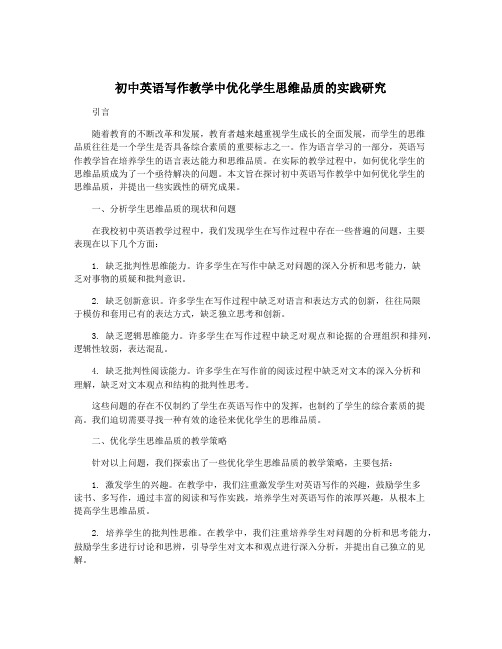
初中英语写作教学中优化学生思维品质的实践研究引言随着教育的不断改革和发展,教育者越来越重视学生成长的全面发展,而学生的思维品质往往是一个学生是否具备综合素质的重要标志之一。
作为语言学习的一部分,英语写作教学旨在培养学生的语言表达能力和思维品质。
在实际的教学过程中,如何优化学生的思维品质成为了一个亟待解决的问题。
本文旨在探讨初中英语写作教学中如何优化学生的思维品质,并提出一些实践性的研究成果。
一、分析学生思维品质的现状和问题在我校初中英语教学过程中,我们发现学生在写作过程中存在一些普遍的问题,主要表现在以下几个方面:1. 缺乏批判性思维能力。
许多学生在写作中缺乏对问题的深入分析和思考能力,缺乏对事物的质疑和批判意识。
2. 缺乏创新意识。
许多学生在写作过程中缺乏对语言和表达方式的创新,往往局限于模仿和套用已有的表达方式,缺乏独立思考和创新。
3. 缺乏逻辑思维能力。
许多学生在写作过程中缺乏对观点和论据的合理组织和排列,逻辑性较弱,表达混乱。
4. 缺乏批判性阅读能力。
许多学生在写作前的阅读过程中缺乏对文本的深入分析和理解,缺乏对文本观点和结构的批判性思考。
这些问题的存在不仅制约了学生在英语写作中的发挥,也制约了学生的综合素质的提高。
我们迫切需要寻找一种有效的途径来优化学生的思维品质。
二、优化学生思维品质的教学策略针对以上问题,我们探索出了一些优化学生思维品质的教学策略,主要包括:1. 激发学生的兴趣。
在教学中,我们注重激发学生对英语写作的兴趣,鼓励学生多读书、多写作,通过丰富的阅读和写作实践,培养学生对英语写作的浓厚兴趣,从根本上提高学生思维品质。
2. 培养学生的批判性思维。
在教学中,我们注重培养学生对问题的分析和思考能力,鼓励学生多进行讨论和思辨,引导学生对文本和观点进行深入分析,并提出自己独立的见解。
3. 开展创新写作活动。
在教学中,我们注重引导学生进行创新写作,鼓励学生尝试各种不同的表达方式和结构,培养学生的独立思考和表达能力。
初中英语听力教学中培养思维品质的研究

初中英语听力教学中培养思维品质的研究1. 引言1.1 背景介绍With the development of globalization and the increasing importance of English as a global language, English listening skills have become essential for students in China. However, traditional listening teaching methods in middle schools often focus on memorizing vocabulary and grammar rules, neglecting the cultivation of students' thinking qualities.1.2 研究目的1. Investigate the current status of middle school English listening teaching, including common problems and challenges faced by students and teachers.2. Analyze the significance of developing students' thinking qualities, such as analytical skills, logical reasoning, and problem-solving abilities, in improving listening comprehension.3. Explore various strategies and techniques to cultivate students' thinking qualities in English listening teaching, such as active listening exercises, critical thinking tasks, and reflective learning practices.4. Examine real-life case studies where the cultivation of thinking qualities has positively impacted students' listening skills and overall academic performance.5. Develop a set of evaluation criteria to assess the effectiveness of thinking qualities development in middle school English listening teaching.1.3 意义和价值培养初中生的思维品质在英语听力教学中具有重要的意义和价值。
以英语阅读提升高中学生思维品质的实践研究

以英语阅读提升高中学生思维品质的实践研究提高高中学生的思维品质是教育工作者的重要任务。
英语阅读教学是一种有效的方法来促进高中学生的思维品质。
本文通过实践研究的方式,探讨了英语阅读对高中学生思维品质的影响,并提出了相应的建议。
一、研究背景二、研究内容(一)实验方案本研究选择20名高中学生作为研究对象,分为实验组和对照组,每组包括10名学生。
实验组进行英语阅读教学,对照组采用传统教学方式。
在教学结束后,通过问卷调查和测试问卷的形式,对两组学生的思维品质进行比较分析。
(二)实验结果通过对实验组和对照组的数据进行比较分析,得出以下结论:1、实验组学生的阅读能力显著提高,对文章的理解和分析能力得到了提升。
2、实验组学生的思维品质得到了提高,在智力、思维能力、语言表达和批判性思维等方面表现出更高水平。
(三)实验优点1、英语阅读教学能够提高学生的思维品质,这对于高中学生的认知发展至关重要;2、英语阅读教学具有针对性,能够帮助学生提高英语阅读能力,进而影响其思维品质;3、本研究采用了定量的方法来评估英语阅读教学对于学生思维品质的影响,研究具有较高的可信度和有效性。
三、建议基于本研究的结论,我们提出以下建议:1、学校应当加强英语阅读教学的力度,注重培养学生的阅读能力和思维品质;2、教师应当更注重英语阅读教学的针对性,通过对不同学生的特点和需求进行分析,制定有针对性的教学方案;3、学生应当注重平时的阅读量,积极参加课外阅读活动,提高英语阅读能力,并进一步提高思维品质。
总之,本研究结论表明英语阅读教学对于高中学生的思维品质提升有显著的促进作用。
因此,在英语教学过程中,我们应当注重阅读教学,注重培养学生的阅读能力,并进一步提高学生的思维品质。
初中英语写作教学中优化学生思维品质的实践研究

初中英语写作教学中优化学生思维品质的实践研究一、引言英语写作在初中阶段是学生学习英语时非常重要的一个环节,它既可以帮助学生巩固所学的语法知识和单词量,又可以培养学生的逻辑思维能力和创造力。
在实际的教学中,许多学生在写作过程中常常陷入思维僵化的状态,表达能力、逻辑性和创造性都比较薄弱。
本文将针对初中英语写作教学中如何优化学生思维品质展开一定的实践研究,希望能够为解决这一问题提供一些有益的思路和方法。
二、学生思维品质的现状分析在初中英语写作教学中,许多学生在表达能力、逻辑性和创造性方面存在一定的问题。
其中主要表现在以下几个方面:1、表达能力不足许多学生在写作过程中常常遇到词不达意,表达不清晰的情况。
他们有时往往知道要表达的意思,却找不到合适的单词或句型来表达,使得文章显得拖沓乏味。
有时候甚至会出现语法错误、谬误、乱用词语等问题。
2、逻辑性不强许多学生在写作时常常缺乏逻辑性,文章内容组织得杂而无章,或者是重复、啰嗦,没有明确的论点和论据,甚至是无中生有进行无聊的废话。
导致了写作文章难以吸引人,缺乏说服力。
3、创造性不足许多学生在写作时对于语言的运用比较生硬,缺乏丰富多样的句型和词汇,使得文章内容显得死板枯燥,缺乏想象力。
以上种种问题都反映了学生在思维品质方面的问题,他们在写作中往往缺乏灵活性、创造性和逻辑性,这也制约了他们英语写作能力的提高。
三、优化学生思维品质的实践策略为了解决学生在思维品质方面的问题,我们需要采取一系列的实践策略,帮助学生提高写作能力,培养他们的思维品质。
具体而言,可以从以下几个方面进行实践:1、鼓励学生多读多写阅读和写作是相辅相成的,只有多读书,才能积累丰富的词汇和句型,才能提高自己的写作能力。
教师应该鼓励学生多读一些名家的作品,这样可以帮助学生提高自己的写作水平,同时也可以培养学生的创造力和想象力。
2、引导学生进行思维导图在引导学生进行写作之前,可以让学生进行思维导图的训练,帮助他们将自己的想法进行逻辑性分析和组织。
初中英语写作教学中优化学生思维品质的实践研究

初中英语写作教学中优化学生思维品质的实践研究一、引言初中英语写作教学是培养学生综合语言能力的重要环节,同时也是培养学生思维品质的关键途径。
目前许多学生在英语写作中存在着思维贫乏、表达能力差的问题,这直接影响了他们的写作成绩和语言素养的提升。
如何优化学生的思维品质,提高他们的写作能力成为了英语教学中的重要课题。
二、学生思维品质的分析1. 思维品质的重要性思维品质是指一个人的思考方式、思维能力和思维水平,是人们认识事物、解决问题、表达情感的能力。
而在写作中,思维品质直接关系到文章的内容、结构和语言表达,因此是提高学生写作能力的重要环节。
2. 学生思维品质存在的问题目前,许多初中学生在写作中存在着思维贫乏、逻辑不清、表达能力差的问题。
他们在写作时常常无法准确把握文章的中心思想,逻辑混乱,表达粗糙,这直接影响了他们的写作质量。
1. 激发学生的求知欲激发学生的求知欲是优化学生思维品质的重要途径。
教师可以通过引导学生阅读各类文本,引发学生对知识的兴趣;组织课外读书会,让学生在阅读中不断拓展自己的知识面;鼓励学生参加各种知识竞赛,激发其求知欲。
2. 引导学生善于思考在写作教学中,教师应该引导学生养成善于思考的习惯。
可以通过提出问题、讨论话题等方式,引导学生思考,激发其思维活跃性;在写作过程中,鼓励学生从不同角度思考问题,培养其多元化的思维方式。
3. 提高学生的语言表达能力语言是思维的外在表现,提高学生的语言表达能力是优化思维品质的重要途径。
在写作教学中,教师可以通过扩大学生的词汇量、提升其语法和句式的运用水平,从而提高其语言表达能力,促进其思维品质的提升。
1. 设计富有启发性的写作题目在写作教学中,教师可以设计一些富有启发性的写作题目,引导学生深入思考。
关于环保的话题可以引发学生对环境问题的思考;关于人生观的话题可以引发学生对人生意义的思考等,从而激发学生的思维活跃性。
2. 运用多元化的教学方法在写作教学中,教师应该运用多元化的教学方法,促进学生思维品质的提升。
- 1、下载文档前请自行甄别文档内容的完整性,平台不提供额外的编辑、内容补充、找答案等附加服务。
- 2、"仅部分预览"的文档,不可在线预览部分如存在完整性等问题,可反馈申请退款(可完整预览的文档不适用该条件!)。
- 3、如文档侵犯您的权益,请联系客服反馈,我们会尽快为您处理(人工客服工作时间:9:00-18:30)。
英语思维品质研究报告范文
Research Report on the Quality of English Thinking
1. Introduction
English thinking quality refers to the ability to think critically, creatively, and analytically in the English language. It is an essential skill for effective communication, problem-solving, and decision-making. This research aims to investigate the factors influencing the quality of English thinking and propose strategies for its improvement.
2. Methodology
The research employed a mixed-method approach, combining both quantitative and qualitative data. The participants were 200 English learners from different proficiency levels. A questionnaire was distributed to collect demographic information and self-assessment of their thinking quality. Additionally, in-depth interviews were conducted with a selected group of participants to gather detailed insights.
3. Results
3.1 Quantitative Results
The questionnaire revealed that the majority of participants rated their English thinking quality as average (45%) and above average (41%). Only a small percentage perceived their thinking quality as below average (14%). These findings indicate a generally positive perception of self-thinking abilities in English.
3.2 Qualitative Results
During the interviews, several factors influencing the quality of
English thinking emerged. Firstly, language proficiency plays a crucial role. Participants with higher English proficiency reported experiencing fewer difficulties in formulating thoughts and expressing ideas. Secondly, cultural awareness was identified as an important factor. Those with a deeper understanding of the English-speaking culture were more capable of thinking creatively and critically within that framework. Lastly, self-confidence in using English was found to significantly impact thinking quality.
4. Discussion
The positive perception of English thinking quality indicates a growing awareness and proficiency in this area. However, the findings also suggest a need for improvement, particularly in areas such as language proficiency and cultural understanding.
To enhance English thinking quality, several strategies can be adopted. Firstly, language learning programs should focus on improving linguistic competence, including vocabulary, grammar, and pronunciation. Secondly, cultural immersion activities should be included in curriculums to deepen students' understanding of cultural nuances and foster creative thinking. Additionally, building students' self-confidence through regular practice and encouraging participation in English-speaking activities can be crucial for developing their thinking quality.
5. Conclusion
The research highlights the positive perception of English thinking quality among English learners. However, it also identifies areas for improvement, such as language proficiency and cultural understanding. The proposed strategies, including enhancing
linguistic competence, incorporating cultural immersion activities, and building self-confidence in English usage, can contribute to the improvement of English thinking quality.。
